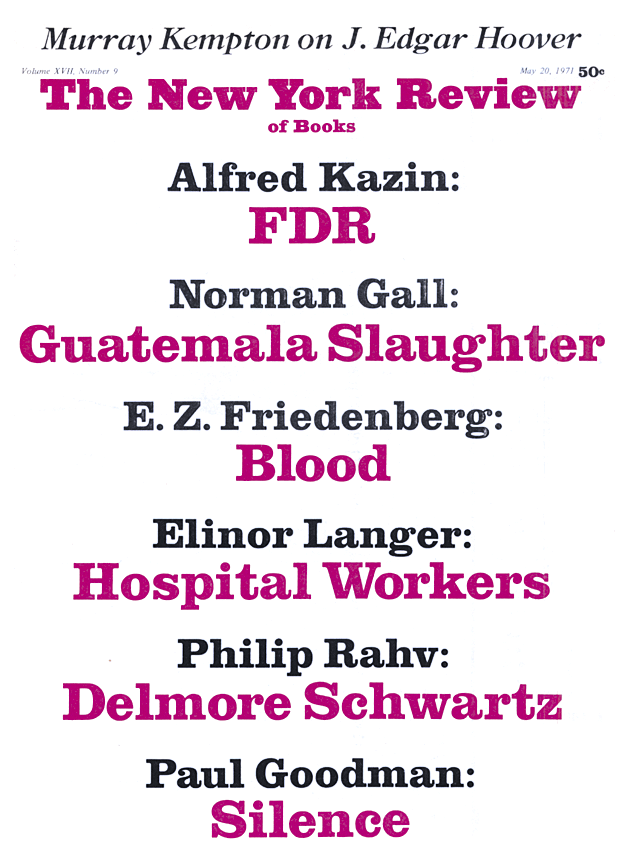In response to:
The Bolivian Guerrilla from the February 11, 1971 issue
To the Editors:
I can overlook the scores of inaccuracies in John Womack’s recounting of the major aspects of Che’s Bolivian campaign in his omnibus review of the literature on the subject, but I cannot forgive him for the unfounded remarks that he makes regarding my book, The Death of a Revolutionary [NYR, February 11]. I can only conclude that he had too much to read, and gave only a passing glance to my book.
Inexplicably he puts my book in the same bag with that of Daniel James and the “scores of articles published in American, Western European, and Latin American journals to explain how the guerrillas could not have been serious, because they failed” (as if Womack could have or did read all these articles). Nowhere does he give any justification for such a remark. It is beyond my comprehension how Womack can assert that I did not take Che’s Bolivian mission seriously or that in my attempts to explain the guerrilla operation I explained it away. Moreover, I am extremely offended by his assertion that I misunderstood the integrity of the guerrilleros’ commitment and the magnitude of their failure. On the contrary, my book is about the integrity of Che and his comrades’ commitment and I deal at length with the significance of their failure.
Finally, Womack’s inexcusable remark that I wrote as if “the guerrillas would have faired better if only they had known what [my] research assistant told me” is obviously based on the false assumption that my research assistant (whose help I acknowledged in the preface) carried out my interviews for me in the typical academic fashion. This, as well as other comments elsewhere throughout his review, betray his own hang-ups with regard to the academic establishment. In my case, he has set up a straw-man (or perhaps a projection of himself) in my place. At any rate, he has done me a gross injustice by assuming that I am an establishment scholar who relies upon his hirelings to do his research for him. He couldn’t be farther from the truth! If he had read beyond the preface of my book, he would have discovered that it was purposely not written in academic style, and that it was undertaken as a labor of love (for Che and his comrades as well as the revolutionary struggle they were fighting for) rather than as a labor of profit or professional acclaim….
Richard L. Harris
University of California
Santa Barbara, California
John Womack replies:
- I did read Harris’s book, carefully. I hope Harris will let me know what are the inaccuracies he found in my essay.
- It is not “inexplicable” that I compared his book with Daniel James’s book and “scores of articles,” which I have read. I tried to explain why I thought they were alike, and I regret that he did not understand my explanation. Even if he understood it, I assume that we would still disagree about the significance of his book.
-
I do not quite know how to take Harris’s last paragraph. It seems to be a series of charges against me, in defense of his book. The gist is, I suppose, that I got his book wrong because (a) I belong to an academic establishment which gives me “hang-ups,” (b) I conceive of intellectual work as being either for profit (or praise) or for love, and (c) I appreciate work for profit (or praise) and scorn work for love.
To the first charge I will not reply, for I have already published all I think I have worth saying now about the strains on intellectuals contemplating revolutionary politics.
The second and third charges I deny. Without pretending to offer original observations, I will say only that I think intellectuals do their work mostly out of curiosity about their subject, and often out of love for it. They may live partly on the royalties or fees from it, and they may enjoy (or suffer embarrassment from) praise for it. But they do their work mostly because it fascinates them. Its value depends not on their motives, but on its contribution to the truth about the world.
In this case it is immaterial how Harris’s research assistant did his interviews, whether or not Harris wrote the book in “academic style,” whether or not he is making money from it, whether or not he is happy or hurt by remarks about it, and whether or not he undertook it for love of Che. What counts is how much of the truth it conveys about Guevara’s operation in Bolivia. I have already said how much I thought it conveyed.
This Issue
May 20, 1971


